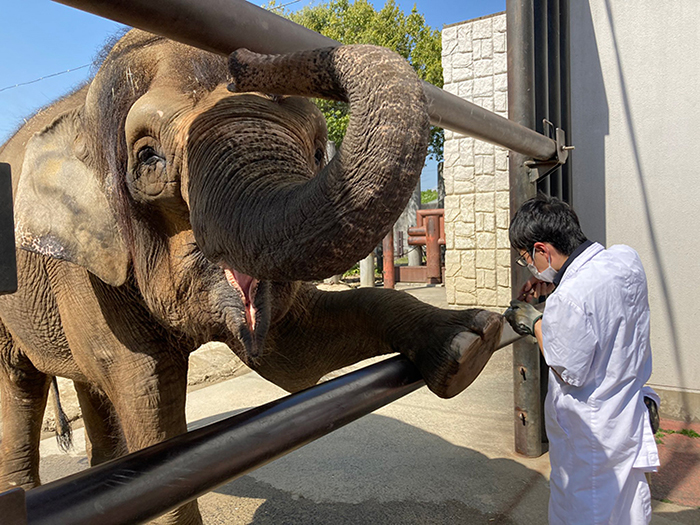Niigata, Japan – Tuberculosis (TB) is an infectious disease caused by Mycobacterium tuberculosis (Mtb); the leading cause of human death due to a single pathogen before the emergence of SARS-CoV-2. In elephants, the infections and deaths with TB have been reported worldwide, and elephant-to-human transmission has also been reported. Therefore, elephant TB is a concern for both conservation of this endangered animal and public health.

Credit: Fukuyama Zoo
Niigata, Japan – Tuberculosis (TB) is an infectious disease caused by Mycobacterium tuberculosis (Mtb); the leading cause of human death due to a single pathogen before the emergence of SARS-CoV-2. In elephants, the infections and deaths with TB have been reported worldwide, and elephant-to-human transmission has also been reported. Therefore, elephant TB is a concern for both conservation of this endangered animal and public health.
Most human TB cases develop from long-term asymptomatic infection, called latent TB (LTBI). Therefore, methods for early detection of infection and the development are necessary to control TB. However, it is difficult to apply the same tests used in humans, such as sputum collection or chest X-ray, to elephant. Therefore, antibody tests using serum, which is relatively easy to collect, have been studied in recent years, but only a few types of antigens have been investigated so far.
At Fukuyama Zoo in Hiroshima, an Asian elephant (Elephas maximus borneensis, named Fuku) developed TB in 2015, and its three-year treatment was completed in 2018. This was the first TB treatment for elephants in Japan, as elephant TB had been reported in Japan, but all were diagnosed through postmortem examinations. For this case, sera from 12 years prior to the development of the disease to one year after the completion of treatment had been cryopreserved. The research team from Niigata University and the University of Miyazaki, among others, investigated IgG antibodies against Mtb proteins in Fuku’s serum using Enzyme-Linked Immuno Sorbent Assay (ELISA).
First, the presence of antibodies against two Mtb proteins, ESAT6/CFP10 and MPB83, was tested by DPP (Chembio, USA), a rapid TB test kit for elephants that is already in use worldwide. As a result, antibodies against ESAT6/CFP10 were detected in all sera tested. This suggested that the elephant had been infected with Mtb 12 years prior to the development of disease, and developed the disease after a prolonged asymptomatic infection, similar to latent TB in humans.
Next, they tested for the presence of IgG antibodies to 11 Mtb proteins, including ESAT6/CFP10 and MPB83, by ELISA. In addition to ESAT6/CFP10 and MPB83, IgG antibodies to the protein Antigen 85B (Ag85B) were detected. In contrast, IgG antibodies against ESAT6/CFP10 and Ag85B were not detected with sera from seven healthy elephants, suggesting their specificity for elephant TB. The quantitative monitoring of IgG levels against these Mtb proteins showed that IgG against ESAT6/CFP10 remained at high levels consistently, without effects by the development of TB or treatment. On the other hand, IgG against Ag85B were not found 12 years prior to disease onset, but increased sharply 2 years prior to disease development and declined with treatment. Ag85B is a cell wall synthase that is produced by Mtb during its replication. It is likely that increase of Anti-Ag85B IgG before the disease onset is reasonable. There is no substantial tool to predict TB development from latency before the disease development. This study implies usefulness of Ag85B IgG for detection of TB progression from latent TB.
Based on these results, the research team suggested a new test method to detect Mtb infection with ESAT6/CFP10 and to monitor disease development and treatment with Ag85B. However, these results are findings based on only one case. Therefore, the first author Dr. Satoshi Ishikawa, Professor Sohkichi Matsumoto in Niigata University and Professor Naoaki Misawa (University of Miyazaki) said, “we would like to conduct joint research with universities in Southeast Asia, and verify the present results with many elephant-TB cases in the future. And more, TB is difficult to diagnose in asymptomatic infection also in humans.” They also said, “we would like to examine patient sera to see if the antibodies found in this study can be detected in humans.”
###
The article “Monitoring IgG against Mycobacterium tuberculosis proteins in an Asian elephant cured of tuberculosis that developed from long-term latency” was published on 12 March 2022 in Scientific Reports, published by Springer Nature.
https://doi.org/10.1038/s41598-022-08228-7
Journal
Scientific Reports
DOI
10.1038/s41598-022-08228-7
Article Title
Monitoring IgG against Mycobacterium tuberculosis proteins in an Asian elephant cured of tuberculosis that developed from long-term latency
Article Publication Date
12-Mar-2022




